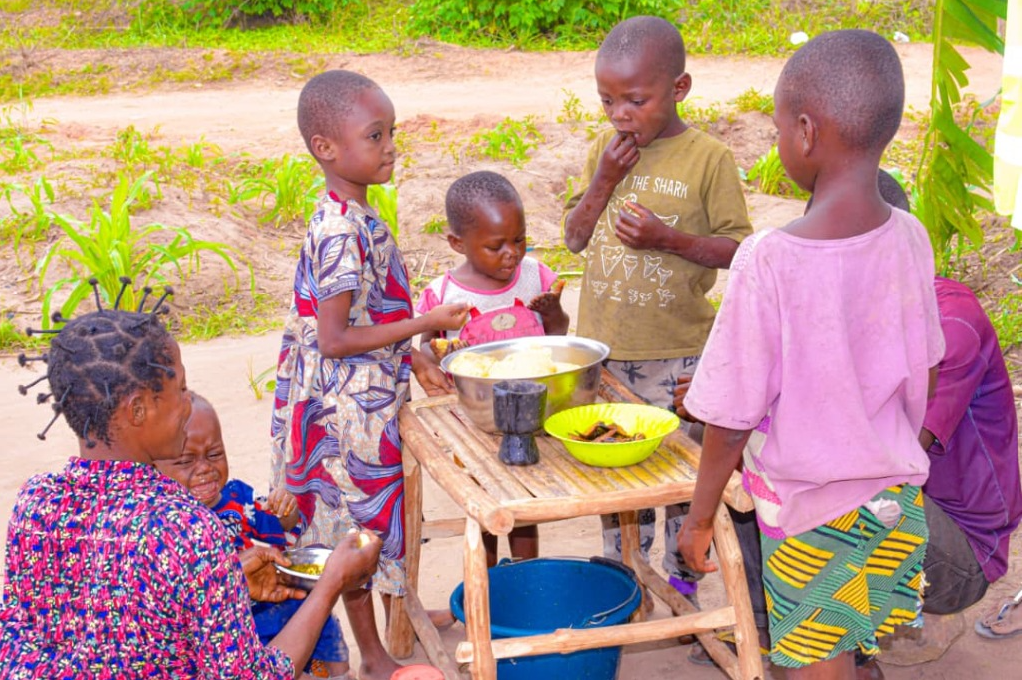CWS is responding to acute food insecurity in Kasai Centrale, Democratic Republic of Congo, where the entire province is experiencing a crisis-level classification of hunger. Through emergency cash transfers and market‑based support, CWS is helping families in Kazumba Territory survive the lean season and build resilience.
Understanding Food Insecurity in Kasai Centrale

Last year, CWS launched a new food assistance initiative to support thousands of vulnerable families in Kasai-Central Province.
Kasai Centrale, a province in the Democratic Republic of Congo (DRC), is experiencing one of the most severe food insecurity emergencies in the region. According to the Integrated Food Security Phase Classification (IPC), the entire province is currently in Phase 3 (Crisis)—meaning households are unable to meet basic food needs without depleting essential assets. Alarmingly, 5% of the population is in Phase 4 (Emergency), where hunger is life‑threatening.
The crisis is driven by a combination of factors: prolonged conflict, displacement, weak infrastructure and climate shocks that have disrupted agricultural production. Families are surviving on limited subsistence farming and foraging, meeting only about 30% of their food needs. The lean season from August to November 2025 has intensified the crisis, leaving thousands at risk of starvation.
CWS’s Response to Crisis-Level Needs
Last year, CWS expanded its work in the DRC by opening an office in Kananga, the capital of Kasai-Central Province. To respond to the urgent hunger crisis, we launched an emergency cash transfer program in Kazumba Territory. From August through December 2025, the program is reaching 1,575 of the most food‑insecure households—about 8,600 people—in Miao and Musuasua sectors.
Each household receives CAD $138 per month (USD $16.80 per person), an amount designed to close the critical 70% food gap identified in assessments. Families currently meet only about 30% of their food needs through subsistence farming and foraging, so this direct cash support allows them to buy food immediately, reducing hunger while preserving dignity and choice.
CWS’s response goes beyond short‑term relief. By partnering with local entrepreneurs and food vendors, including suppliers from Kananga town, the program ensures that nutritious staples such as beans, rice, maize, soybeans and cooking oil are consistently available in local markets.
This market‑based approach not only stabilizes food access and improves household consumption but also strengthens fragile local economies. It reduces dependency on outside aid while supporting small businesses that are vital for long‑term recovery.
The program focuses on those most at risk of extreme hunger and least likely to receive other assistance: female‑headed households, elderly individuals, families with young children and people living with disabilities.
Ongoing Needs for Impacted Communities
This emergency response is designed to cover the August–November lean season, the most difficult months of the year when food insecurity peaks in Kazumba Territory. By bridging the food gap during this critical period, CWS is helping families survive immediate hunger while laying out the groundwork for longer‑term resilience.
The IPC crisis in Kasai Centrale underscores the urgent need for sustained humanitarian action and investment in resilient food systems. CWS’s emergency cash transfer program demonstrates how community‑centered, market‑based solutions can save lives while strengthening local capacity.
As Kasai Centrale continues to face overlapping challenges of conflict, climate shocks and poverty, CWS remains committed to walking alongside communities—ensuring that no family faces hunger alone.
To learn more about our work in the Democratic Republic of Congo, click here.
